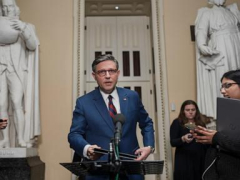With hours to go before a midnight government shutdown, the House approved a new plan from House Speaker Mike Johnson that would temporarily fund federal operations and disaster aid, but dropped President-elect Donald Trump’s demands for a debt limit increase into the new year.
The vote came a day after the House rejected Trump’s new plan to fund operations and suspend the debt ceiling, as Democrats and dozens of Republicans refused to accommodate his sudden demands.
Here’s the latest:
“I have very good news for my colleagues and for the country,” Majority Leader Chuck Schumer said in announcing a time agreement for the vote.
And while the bill won’t get to President Joe Biden to be signed into law before funding lapses, don’t expect to see an impact on government operations.
There will not be agency furloughs, and most federal workers are already off the clock over the weekend anyhow.
According to the Committee for a Responsible Federal Budget, a budget watchdog, 10 funding gaps of three days or fewer have occurred since 1981. Most took place over a weekend, when government operations were only minimally affected.
Majority Leader Chuck Schumer says Senate Republicans and Democrats have reached an agreement that will allow them to take a vote late Friday on the government funding package.
Schumer said on the Senate floor that the time agreement would allow passage “before the midnight deadline.”
There will be a series of votes ahead of final passage, but support for the legislation is clear in the Senate.
In a late-night maneuver, the Senate passed a bipartisan bill that authorizes research on pediatric cancer after a similar proposal was cut when House Republicans abandoned the first funding deal this week.
Sen. Tim Kaine, a Virginia Democrat, pushed a bill to final passage through unanimous consent — a rarely successful procedure that allowed quick approval because no senator objected. It extends for five years a program at the National Institutes of Health to research pediatric cancer and other diseases.
The government funding legislation that passed the House earlier Friday was a slimmed-down package from a deal that congressional leaders initially reached. Some Republicans, along with Elon Musk, celebrated that as a victory, but Democrats singled out the pediatric cancer research funding as an example of the things they were cutting.
The cancer research bill that gained final approval authorizes the program for a shorter period than congressional proponents had hoped, however, and other health research from the first funding proposal was still abandoned.
The Senate is moving to a final vote on a proposal to boost Social Security payments for millions of people, potentially pushing a longtime priority for former public employees through Congress in one of its last acts for the year.
The bipartisan bill would eliminate longtime reductions to Social Security benefits for nearly 3 million people who receive pensions because they worked in federal, state and local government, or public service jobs like teachers, firefighters and police officers. Advocates say the Social Security Fairness Act rights a decades-old disparity, though it would also further strain Social Security Trust Funds.
The legislation has been decades in the making, but the push to pass it came together in the final weeks that lawmakers were in Washington before Congress resets next year. All Senate Democrats except one, as well as 23 Republicans, supported the effort to bring it to a final vote.
▶ Read more about the Social Security legislation
President Joe Biden secured the 235th judicial confirmation of his presidency, an accomplishment that exceeds his predecessor’s total by one after Democrats put extra emphasis on the federal courts following Donald Trump’s far-reaching first term, when he filled three seats on the Supreme Court.
Senate Majority Leader Chuck Schumer, D-N.Y., teed up votes on two California district judges, and they were likely to be the last judicial confirmations this year before Congress adjourns and makes way for a new, Republican-led Senate.
The confirmation of Serena Raquel Murillo to be a district judge for the Central District of California broke Trump’s mark. Come next year, Republicans will look to boost Trump’s already considerable influence on the makeup of the federal judiciary in his second term.
▶ Read more about the judges’ confirmation
Johnny Zuagar says he’s tried to hide his worries about a potential government shutdown from his three boys as he weighs how much to spend on Christmas presents.
“I’ve got to keep a poker face,” Zuagar, a statistician at the U.S. Census Bureau, said when thinking about his boys, ages 14, 12 and 6. “You’re just trying to take that worry off of your family.”
Like thousands of federal workers, Zuagar is navigating the holidays with the spirit of the season overtaken by an air of gloom and uncertainty.
The turbulent efforts in Congress to reach an agreement on funding the federal government have cast a cloud over the holidays for many federal workers facing possible furloughs in the days before Christmas. The House on Friday passed a three-month government spending bill just hours before a government shutdown, but its fate in the Senate was uncertain as the deadline loomed.
▶ Read more about federal workers
Republican House Speaker Mike Johnson said he spoke with both President-elect Donald Trump and billionaire Elon Musk around the time of the vote on the government funding package.
Trump understood “exactly what we were doing, and why,” Johnson said. “I think he was certainly happy about the outcome, as well.”
As for Musk, who has been suggested by some as a replacement as speaker, Johnson said they talked about “the extraordinary challenges of the job.”
“I said, hey, you want to be House speaker? I don’t know,” Johnson said.
Musk told him, “This may be the hardest job in the world,” Johnson said.
Hakeem Jeffries, whose support would make or break Republican Speaker Mike Johnson’s plan, called the House’s passage of the government funding bill “a victory for the American people.”
House Democrats helped squash Trump’s insistence on a debt ceiling increase by voting against the earlier bill. But on Friday they put up more votes than Republicans to push the final package to passage.
“The House Democrats have successfully stopped extreme MAGA Republicans from shutting down the government, crashing the economy and hurting the working class Americans all across the nation,” Jeffries said.
Legislation to avoid a government shutdown passed by the House is now heading across the Capitol, where senators are hoping to act before the midnight deadline.
With only hours to go, a process that normally takes days will have a much faster timeline. First, House staff will physically walk the bill over to the Senate. Then Senate leadership – still Democrats until Jan. 3 – will have to negotiate with Republicans to speed up the normally lengthy process to get the bill passed in time.
While it may take a few hours to figure out, senators are less likely to object to a quick vote as most of them are eyeing plane flights out of Washington for the holidays.
Senate Majority Leader Chuck Schumer said he hopes the bill will pass “as soon as possible.”
“The House has overwhelmingly passed a bill to keep the government open and I’m confident the Senate will pass it as well,” he said.
If the Senate passes the bill, it will then go to the White House for President Joe Biden’s signature.
Hours to go before a midnight government shutdown, the House approved a new plan late Friday from Speaker Mike Johnson that would temporarily fund federal operations and disaster aid, but drops President-elect Donald Trump’s demands for a debt limit increase into the new year.
Johnson insisted Congress would “meet our obligations” and not allow federal operations to shutter ahead of the Christmas holiday season. But the day’s outcome was uncertain after Trump doubled down on his insistence that a debt ceiling increase be included in any deal — if not, he said in an early morning post, let the closures “start now.”
The bill was approved 366-34 and now goes to the Senate for expected quick passage.
President-elect Donald Trump’s billionaire ally Elon Musk played a key role this week in killing a bipartisan funding proposal that would have prevented a government shutdown, railing against the plan in more than 100 X posts that included multiple false claims.
Not only did the owner of the social platform X, an unelected figure, use his outsize influence on the platform to help sway Congress, he did so without regard for the facts and gave a preview of the role he could play over the next four years.
“Trump has got himself a handful with Musk,” said John Mark Hansen, a professor of political science at the University of Chicago. “Trump’s done this kind of thing before, blowing up a bill at the last minute. This time, though, it looks like he was afraid of Musk upstaging him. Now there’s a new social media bully in town, pushing the champion social media bully around.”
▶ Read more about Musk, the spending bill and misinformation on X
House Speaker Mike Johnson has set a vote for Friday evening on a new plan that would temporarily fund federal operations and disaster aid, but punted President-elect Donald Trump demands for a debt limit increase into the new year.
The outcome is uncertain. Johnson declined to disclose the new idea under consideration, but lawmakers said it would fund the government at current levels through March and adds $100 billion in disaster aid and $10 billion in agricultural assistance to farmers.
The vote comes ahead of a potential government shutdown at midnight.
“Depending on if the House can execute, I think we could probably tee everything out for later today,” said Sen. John Thune, who’ll take over as Senate majority leader in January.
“I think a





